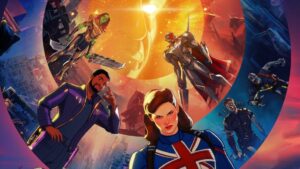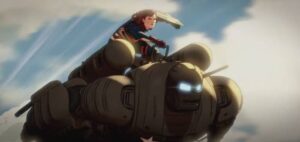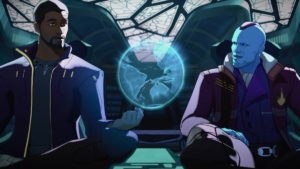SPOILERS FOR WHAT IF…? AHEAD!
Marvel’s What If…? has been working overtime to try and rectify the faults of some not-so-great or downright bad MCU films, from Thor to The Incredible Hulk to Ant-Man And The Wasp, and in today’s episode they’re tackling Age Of Ultron. Even when they’ve succeeded at doing so, I can’t say I’ve been strongly tempted to go back and rewatch any of these movies, but I’ve always been especially conflicted about Age Of Ultron because it’s a movie that has no right to be as bad as it was, and yet in hindsight it’s so obvious why it failed.

On the one hand, there’s a lot to like about it. As the only Avengers movie taking place between the team’s formation and their disintegration, Age Of Ultron gave us some much-needed insight into the Avengers’ family dynamic, and the relationships at play within the group. It introduced us to Wanda Maximoff and Vision, both enduring fan-favorites. It brought us that epic opening action sequence that spun directly out of events on Agents Of S.H.I.E.L.D., and which is still the closest the MCU ever came to linking up with Marvel TV.
But…for every great character moment came a cringeworthy interaction between Black Widow and The Hulk, laced with misogyny. Despite introducing us to Wanda, she was burdened with terrible writing and a ridiculously bad Eastern European accent, while her character’s Romani heritage from the comics was erased and has yet to be restored in the MCU. And apart from that one opening action sequence, the battles were largely unmemorable, and the villain Ultron was a comical caricature with no depth or nuance to his motivations.
Unsurprisingly, most of these problems can be traced back to director Joss Whedon. The extent of Whedon’s reprehensible behavior on multiple sets throughout his career is still just being brought to light, thanks to people like Ray Fisher and Charisma Carpenter speaking up about his abuses of power. Whedon’s tyrannical arrogance is how we ended up with a theatrical cut of Justice League so bad that Warner Brothers had to release a better version of the same movie earlier this year, and it’s how we ended up with an Age Of Ultron movie so bad that What If…? had to at least try and fix it.
So of course today’s episode of What If…? is perfectly suited for me, or anybody who’s ever wished that the best elements of Age Of Ultron could be isolated and transplanted into another, better, movie (or in this case, a thirty-minute long animated episode of streaming television), discarding everything that didn’t work…which is most of Whedon’s movie, to be honest. The first and foremost change is that in this new timeline, Ultron (voiced by Ross Marquand) is actually a legitimate threat.
Within the first couple of minutes, we’re treated to an unhappy alternate ending to Age Of Ultron that’s arguably – no, definitely better than the actual third act of that movie. Ultron gets his hands on Vision and downloads his consciousness into the android’s body, before shortcutting his plan to exterminate the human race by simply cracking the world’s nuclear codes and raining fire from the skies. It’s a lot easier and less melodramatic than building giant propeller engines beneath a random Eastern European city, and trying to use said city as a meteor to cause global extinction.
But what do you know, it’s also less effective. Because while almost everyone on earth dies in the nuclear firestorm, two Avengers survive – Natasha Romanoff (voiced by Lake Bell) and Clint Barton (Jeremy Renner). Not exactly useless now, are they? How they survived the initial apocalypse is left a mystery, but it’s very clear when we pick up with them again that they’ve been on their own for quite some time, using their wits to scrape by. On their own, neither of them is strong enough to take on Ultron, but Romanoff comes up with a classic Black Widow plan to save the day, which involves breaking into the apocalypse-proof KGB archives in Moscow – and finding the key to resurrecting HYDRA’s own villainous AI, Arnim Zola (Toby Jones).

Even though I’m pretty much indifferent towards MCU Hawkeye, there is something inspiring about watching these two characters in particular as they struggle to overcome an opponent they know is far too strong at this point to be dispatched with an arrow or a kick. Neither of them has a superpower (beyond Hawkeye’s precision), neither has a great weapon (Natasha finds her father’s shield from his days as Red Guardian, but that’s later), and neither should logically have survived a catastrophe of this scale in the first place. But they did, so they’ll be the ones to stop Ultron or they’ll die trying.
And rest assured that both heroes get to prove themselves in battle against Ultron’s hordes of sentry bots. Their fast-paced fight scenes make good use of What If…?‘s sleek animation style and fluid character movements, and Natasha in particular has some very cool moments, while Hawkeye makes the sacrifice play to save his friend (and Zola’s delightfully chatty consciousness in a robot body) in a scene evocative of Natasha’s self-sacrifice in Endgame. But in this universe at least, only another computer program like Zola has a chance of combating Ultron.
That’s something that becomes abundantly clear as Ultron leaves earth and sweeps through the universe, seeking out life in every corner of the cosmos and eradicating it as part of his objective to protect existence from itself. He obliterates Asgard, Xandar, Ego, and The Sovereign, killing the Guardians of the Galaxy in the process. He cuts Thanos in half with his laser-beam like a slice of salami meat, and takes the Infinity Stones from his corpse, adding them to his already impressive arsenal of weaponry. Captain Marvel (voiced by Alexandra Daniels) puts up a good fight, but Ultron kills her too, releasing a shock-wave that annihilates an entire string of nearby planets. He is without equal in the universe.
But the Marvel Cinematic Universe is a Marvel Cinematic Multiverse now, and Ultron becomes aware of that fact when he overhears What If…?‘s narrator, The Watcher (voiced by Jeffrey Wright), talking about him from outside the boundary of his own universe. Something similar happened in episode four when Doctor Strange Supreme (Benedict Cumberbatch) reached a level of power where he became capable of communicating with The Watcher through the boundary, but the difference – and what ultimately makes Strange Supreme slightly less of a villain than Ultron – is that he didn’t literally break the fourth wall to try and attack The Watcher. Strange Supreme’s greatest flaw was his humanity, but humans are capable of feeling regret and guilt, and even in rare cases of admitting wrongdoing.
Ultron is not human, however, and he has no conscience, which means there’s nothing to prevent him from trying what Strange Supreme would not. What follows is a clash of titans unlike anything we’ve seen in the MCU up until this point, and we just saw Captain Marvel go up against Thor last week. The Watcher is a cosmic entity of indescribable power and intellect, and Ultron is a mercilessly destructive computer program clothed in the synthetic flesh of Vision and spangled with Infinity Stones – when they throw punches, they break holes in the very fabric of reality. At one point, Ultron even goes full Galactus and swallows a star-system whole (but since he’s using Vision’s body, and Vision canonically doesn’t have a digestive system, that should have been the end of him).
The Watcher is a surprisingly good fighter, and Jeffrey Wright finally gets something to do in this show (not that the little motivational speeches weren’t cute and all), but even he is no match for Ultron and must ultimately run and hide. It’s only then that The Watcher realizes it’s up to him to stop Ultron, even if it means breaking his ancient oath to never intervene with the natural course of history. The countless tragedies that The Watcher watched and never did anything to avert apparently weren’t enough to make him question his oath, but losing a fight with a computer is the last straw.
To add insult to injury, the only place where The Watcher can hide is in the remains of Doctor Strange Supreme’s former universe. But in a lucky twist of fate, Strange Supreme might just be The Watcher’s best bet at defeating Ultron. We also know of several other characters who will join the unofficial Guardians of the Multiverse team in next week’s episode, including Party Thor (not sure how much help he’s gonna be, but okay), Killmonger, T’Challa as Star-Lord, and Captain Carter, not to mention survivor Black Widow and AI Arnim Zola. That’s a weird line-up of characters right there, the kind that could only come about via the Multiverse, and frankly I can’t wait to see how they interact.

I’m also scared, because the stakes are unusually high going into the finale, and we don’t have any assurance that all of these characters will survive the confrontation with Ultron. The Watcher will presumably live to narrate another season of What If…?, and Captain Carter’s apparently headed for the movies, but everybody else is in serious danger. That’s a testament to the fact that What If…? is largely unafraid to kill off beloved heroes, and to the fact that Ultron is more threatening now than he ever was in Age Of Ultron. It’s never too late for redemption in the MCU.
Episode Rating: 8.5/10








